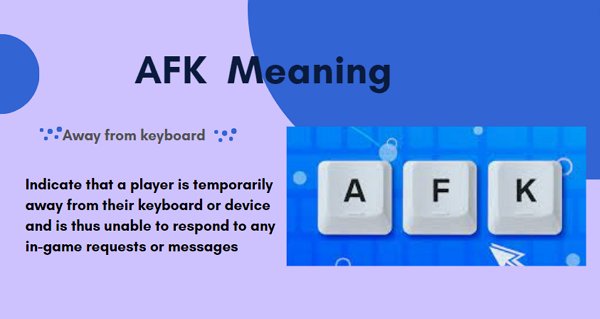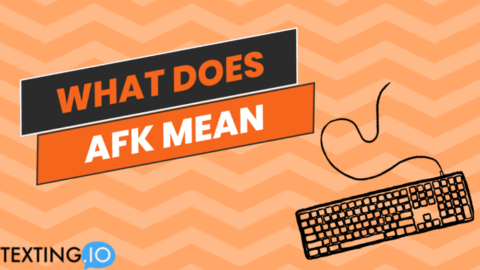What Does AFK Mean? Your Ultimate Guide To 'Away From Keyboard'
In the vast and ever-evolving landscape of online communication, new terms and abbreviations emerge constantly, becoming integral parts of our digital vocabulary. One such term you've likely encountered, especially if you spend time in online games, chatrooms, or social media, is "AFK." But what exactly does AFK mean, and why is it so widely used? If you've ever found yourself wondering, "What does AFK stand for?" or "When should I use it?", you're in the right place. This comprehensive guide will demystify AFK, exploring its origins, its core meaning, and its diverse applications across various online platforms.
AFK Unpacked: The Core Meaning
At its heart, AFK is a straightforward abbreviation that serves a very practical purpose in online interactions. According to numerous sources, including common usage and dictionaries, AFK stands for "Away From Keyboard." This simple phrase is a quick and effective way to communicate a specific status to others in a digital space. It tells people that you are currently not at your computer or device, or that you are temporarily unavailable to respond to messages or participate in an ongoing activity.
The essence of AFK lies in indicating a temporary absence or inactivity. When someone says they are AFK, they are letting you know that they won't be able to respond immediately, or that they are taking a short break from their online presence. It's an informal heads-up, informing recipients that you are doing exactly what the slang says – away from the keyboard, and thus, momentarily out of reach.
The Origin Story of AFK
Like many internet slang terms, AFK has roots deeply embedded in the early days of online communication. Its genesis can be traced back to the burgeoning era of online chatrooms. In these text-based environments, where real-time interaction was key, there was a clear need for users to signal their temporary departure without disrupting the flow of conversation or causing confusion. Imagine a chatroom where someone suddenly stops responding; without a heads-up, others might wonder if they've been ignored, if their message wasn't seen, or if there's a technical issue.
To address this, users began adopting abbreviations that could quickly convey their status. "Away From Keyboard" perfectly encapsulated the idea of stepping away from the physical device that connected them to the online world. Over time, as online interactions became more sophisticated and widespread, AFK stuck, evolving from a niche chatroom term into a universally recognized internet acronym. Its practicality ensured its survival and widespread adoption, making it a staple in various digital communities.
Why and How We Use AFK Today
The primary reason for using AFK remains consistent: to manage expectations and inform others of your temporary unavailability. It's a courtesy that helps maintain smooth communication and coordination in online environments. Here’s a deeper dive into its usage:
Indicating Temporary Absence
The most common use of AFK is to signal that you are stepping away from your computer or device for a short period. This could be for various reasons, from grabbing a drink to attending to something in the real world. By stating "AFK," you let others know that you won't respond for a few minutes, or that you are offline and taking a break. It's a clear signal that your current online presence is inactive.
Managing Expectations in Online Interactions
In collaborative online spaces, AFK is crucial for setting expectations. If you're in a team game or a group chat, letting others know you're AFK prevents them from waiting for your input or assuming you're ignoring them. It fosters better communication and understanding among participants.
Common Contexts for AFK Usage
AFK has transcended its chatroom origins and is now prevalent across a multitude of online platforms and scenarios:
- Online Chatrooms and Messaging Apps: This is where AFK first gained traction. Whether you're in a private chat, a group discussion on platforms like WhatsApp, Telegram, or even older IRC channels, typing "AFK" lets your contacts know you're stepping away.
- Online Gaming: Perhaps the most prominent domain for AFK today is online gaming. In multiplayer games, a player going AFK means they are not actively participating, often standing still or being controlled by AI. This is vital information for teammates who rely on coordinated efforts. Gamers use it to inform others they're taking a quick break, perhaps to grab a snack or answer the door. It's a common acronym used by gamers to indicate temporary unavailability or inactivity.
- Livestreaming: Streamers on platforms like Twitch often use "AFK" to inform their viewers that they are stepping away from their desk for a moment, perhaps for a bathroom break or to attend to something off-camera. This keeps the audience informed and prevents confusion about why the streamer isn't interacting.
- Social Media: While less common for direct "AFK" announcements, the concept still applies. On platforms like Twitter or Instagram, if someone mentions they're "going AFK" for a while, it implies they won't be actively checking or posting for a period.
- Texting and General Online Communication: Even in informal texting, AFK can be used to convey that you're stepping away from your phone and won't be responsive for a short time. It's an efficient way to communicate a brief pause in communication.
Variations and Related Concepts
While "Away From Keyboard" is the universally accepted meaning, some sources also mention "away from keys" as a slight variation, particularly in the context of mobile devices where a traditional keyboard might not be the primary input. Regardless of the exact phrasing, the core meaning remains the same: a temporary disengagement from active online presence.
Examples of AFK in Action:
Here are a few common ways you might see or use AFK:
- "Hey guys, I'm AFK for 5 mins, grabbing a coffee."
- "Need to go AFK for a bit, be right back in 10."
- (In a game) "PlayerX is AFK at spawn."
- "Going AFK for lunch, catch you all later!"
The Significance of AFK in Digital Etiquette
In a world where much of our interaction happens through screens, terms like AFK play a vital role in establishing and maintaining digital etiquette. They allow for clear, concise communication of status, preventing misunderstandings and fostering a more considerate online environment. By using AFK, you're not just stating your absence; you're showing respect for the other participants in the conversation or activity, letting them know that your unresponsiveness is not due to disinterest but rather a temporary physical absence.
It's a testament to the ingenuity of online communities that such a simple abbreviation could become so universally understood and essential. From its humble beginnings in text-based chatrooms to its omnipresence in modern gaming and streaming, AFK continues to be a cornerstone of efficient and polite online interaction.
Conclusion: No Longer AFK on This Term!
In summary, AFK stands for "Away From Keyboard" and is a widely recognized internet slang term used to indicate that someone has temporarily left their computer or device and won't be able to respond immediately. Originating in early online chatrooms, its utility quickly led to its adoption in online gaming, livestreaming, messaging apps, and general digital communication. It serves as a crucial tool for managing expectations, informing others of your brief absence, and contributing to smoother online interactions. So, the next time you see "AFK" or need to step away from your screen, you'll know exactly what it means and how to use it effectively, ensuring you're never "away from knowledge" regarding this common online abbreviation!

AFK Meaning: Definition, Origin, Use Examples, and More

What Does AFK Mean? - Texting.io

AFK Meaning: What Does AFK Stand for? • 7ESL | Online education, Meant